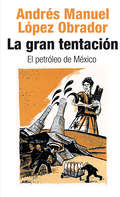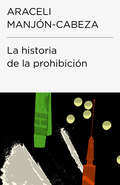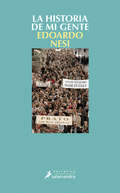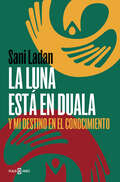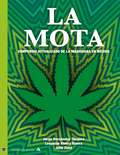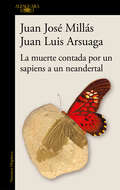- Table View
- List View
La gran degeneración: Cómo decaen las instituciones y mueren las economías
by Niall FergusonUn análisis de las causas del declive actual de occidente. Hace tiempo que se anuncia el declive de Occidente, pero ahora los síntomas de esa decadencia nos acosan: un crecimiento mínimo, una deuda asfixiante, una población envejecida, conductas antisociales. ¿Qué le pasa a la civilización occidental? La respuesta que ofrece Niall Ferguson es que nuestras instituciones, los complejos marcos dentro de los que una sociedad puede florecer o fracasar, están degenerando. El gobierno representativo, el libre mercado, el imperio de la ley y la sociedad civil: estos solían ser los cuatro pilares de las sociedades occidentales. Estas instituciones, más que ninguna ventaja geográfica o climatológica, permitieron el dominio global de Occidente a partir de 1500. En nuestra época, sin embargo, estas instituciones se han deteriorado de modo alarmante. Nuestras democracias han roto el pacto intergeneracional al dejar una pesada carga de deuda a nuestros hijos y nietos. Nuestros mercados cada vez están más distorsionados por regulaciones excesivamente complejas que son la enfermedad de la que pretenden ser la cura. El imperio de la ley se ha convertido en el imperio de los abogados. Y la sociedad civil es ahora la sociedad incivil, en la que esperamos que el Estado resuelva todos nuestros problemas. La gran degeneración es un poderoso y en ocasiones polémico alegato contra una era de negligencia y pasividad. Mientras el mundo árabe lucha por alcanzar la democracia y China avanza de la liberalización económica al imperio de la ley, europeos y estadounidenses malgastan el legado institucional construido a lo largo de varios siglos. Detener la degeneración de la civilización occidental, advierte Ferguson, requerirá líderes audaces y una reforma radical.
La gran familia de Zamora
by Jean Meyer Ricardo FletesEn julio de 2014, la televisión y la prensa escrita dieron a conocer diversas noticias sobre la Gran Familia de Zamora, Michoacán. En varios reportajes se difundieron cargos sin prueba alguna, acompañados por fotografías donde aparecían niñas y niños asustados por un operativo desmedido. El revuelo mediático causó una grave polarización en la ciudadanía... Hoy podemos formular algunas preguntas con más calma: ¿cómo surgió la Gran Familia? ¿Cómo creció y a qué población atendió durante más de 50 años? ¿Cómo se sostuvo esta institución a partir de los valores que rigen el Bajío zamorano? Más allá de la furiosa acción desatada hacia Mamá Rosa, su fundadora y directora, este trabajo ofrece una descripción amplia y un contexto histórico social, rescatando las voces de niñas, niños, adolescentes, jóvenes, médicos, profesores y otros actores que entraron en contacto con la institución.El lector podrá sacar sus propias conclusiones y ampliar sus reflexiones sobre la manera en la que se percibe y aborda la cuestión de la infancia pobre en nuestro país.
La gran tentación: El petróleo de México
by Andrés Manuel López ObradorEste libro plantea una pregunta fundamental para el desarrollo del país: ¿Por qué el gobierno quiere privatizar Pemex como un asunto de vida o muerte, y por qué hay que oponerse? La gran tentación: el petróleo de México, escrito por Andrés Manuel López Obrador y editado por Grijalbo, es una obra, sólida y concisa, con apenas algo más de 200 páginas, y se suma, por méritos propios, a la bibliografía fundamental sobre el tema petrolero en México. El título, surgido -se precisa- de una conversación del cha Reza Pahlevi con Ryszard Kapuscinski, muestra que, al menos en los últimos 100 años, la idea de controlar los hidrocarburos del país ha constituido, para los países dominantes y las corporaciones petroleras, la gran tentación. El libro se organiza en tres grandes secciones. La primera proporciona un recuento analítico de la historia del petróleo en México, desde las primeras explotaciones, hace algo más de un siglo, en el porfiriato, hasta 1982. La segunda aborda el periodo de alrededor de un cuarto de siglo, del predominio de las políticas neoliberales. En el sector petrolero, de manera cada vez más clara y por completo evidente a partir del nuevo siglo, estas políticas se han orientado a colocar sus recursos al servicio de intereses no sólo distintos, sino contrarios a los de un desarrollo nacional autónomo y participativo. La tercera se refiere a la esperanza. A las opciones abiertas por el Movimiento en Defensa del Petróleo, orientadas a convertir los hidrocarburos -el petróleo y el gas- en el fundamento de un desarrollo diferente, de un modelo alternativo, que sirva a los mexicanos y, por el bien de todos, primero a los pobres.
La guerra de Los Zetas: Viaje por la frontera de la necropolítica
by Diego Enrique OsornoAl investigar las particularidades de lo que se podría denominar el "enigma Z", Diego Osorno advierte los riesgos que corre el país en los años venideros ante un potencial crecimiento desmedido de esta organización criminal. "Diego Enrique Osorno pertenece a la estirpe de los grandes testigos que presencian la aniquilación y escriben la historia para que no se repita." JUAN VILLORO. En el año 2000, cuando el PRI dejó al fin la presidencia de México, en el noreste del país nacieron Los Zetas, una banda que entonces parecía una anécdota fugaz del mundo del narco. Doce años después, el PRI regresa al poder y Los Zetas parecen eternos mientras libran una guerra contra el cártel de Sinaloa, la organización criminal más fortalecida durante los gobiernos panistas. En esta aproximación inédita a una región fronteriza que a diferencia de Tijuana y Ciudad Juárez ha sido poco documentada, Diego Enrique Osorno recorre los sitios que han padecido los mayores estragos de violencia causados por la guerra declarada por Felipe Calderón. En un itinerario que abarca pueblos y ciudades de Nuevo León y Tamaulipas, el autor habla con pobladores, generales, jóvenes sicarios, alcaldes, periodistas, policías, empresarios, migrantes, familiares de desaparecidos y vendedores de armas. Consigue información reveladora, entre la que destacan las confesiones de Óscar López Olivares, el Profe, quien, junto a Juan Nepomuceno Guerra y Juan García Ábrego, fundó el cártel del Golfo. Su relato en voz propia ofrece claves cruciales para conocer la raíz histórica de lo que sucede hoy en día. Así, a lo largo de este viaje, el lector va conociendo cómo durante la transición democrática fallida ocurrió el colapso de la añeja narcopolítica del PRI con la nueva necropolítica del PAN. En definitiva, La guerra de Los Zetas arroja luz sobre los secretos del lugar donde se libra la batalla más importante del México del inicio del siglo XXI.
La guerra de los zetas
by Diego OsornoEn el año 2000, cuando el PRI dejó al fin la presidencia de México, en el noreste del país nacieron Los Zetas, una banda que entonces parecía una anécdota fugaz dentro del mundo del narco. Doce años después, el PRI regresa al poder y Los Zetas parecen eternos mientras libran una guerra contra el cártel de Sinaloa, la organización criminal más fortalecida durante los gobiernos del PAN. En esta aproximación inédita a una región fronteriza que a diferencia de Tijuana y Ciudad Juárez ha sido poco documentada, Diego Enrique Osorno recorre los sitios que han padecido los mayores estragos de violencia causados por la guerra declarada por Felipe Calderón. En un itinerario que abarca pueblos y ciudades de Nuevo León y Tamaulipas, el autor habla con pobladores, generales, jóvenes sicarios, alcaldes, periodistas, policías, empresarios, emigrantes, familiares de desaparecidos y vendedores de armas. Consigue información reveladora, entre la que destacan las confesiones de Óscar López Olivares, el Profe, quien, junto a Juan Nepomuceno Guerra y Juan García Ábrego, fundó el cártel del Golfo. Su relato en voz propia ofrece claves cruciales para conocer la raíz histórica de lo que sucede hoy en día. Así, a lo largo de este viaje, el lector va conociendo cómo durante la transición democrática fallida ocurrió el colapso de la añeja narcopolítica del PRI con la nueva necropolítica del PAN. En definitiva, La guerra de Los Zetas arroja luz sobre los secretos del lugar donde se libra la batalla más importante del México del inicio del siglo XXI.
La guerra sin fin
by Rafael Pardo RuedaUna nueva perspectiva en la lucha contra las drogas La guerra contra las drogas la siguen ganando las drogas. Cinco décadas después de que surgiera el rentable negocio de producción, exportación y consumo de marihuana, en la actualidad gobiernos y agencias antidrogas del mundo siguen buscando estrategias y fórmulas mágicas para vencer en esta cotidiana campaña: la lucha contra los carteles de la marihuana, la amapola, la heroína, la cocaína... Y aunque han sido grandes los esfuerzos, muchas las víctimas y no pocas las victorias, hoy en Colombia se cultiva más coca que nunca. ¿Por qué? En este libro, Rafael Pardo Rueda acude a su experiencia de más de treinta años de trabajo en la problemática antidrogas, a sus difíciles recuerdos como ministro de Defensa de Colombia en la década de los noventa de lo que fue la guerra contra Pablo Escobar y las más sangrientas mafias, y, finalmente, a los retos que tuvo que asumir como alto consejero para el posconflicto una vez las Farc dejaron las armas, para presentar un maravilloso -e infortunadamente entretenido- recuento de lo que ha sido la lucha contra las drogas ilícitas durante los últimos cincuenta años. Estas líneas son la presentación en público de un nuevo planteamiento, una visión distinta sobre hacia dónde dirigir los esfuerzos y recursos, en palabras de un experto en el tema, el cual empieza por aceptar que la guerra ya no es el camino. Entonces, ¿cuál es?
La herida de Paulina
by Elena PoniatowskaElena Poniatowska ofrece en este libro la crónica conmovedora de un caso que generó indignación y alimentó la lucha por los derechos reproductivos de las mujeres mexicanas En 1999, Paulina Ramírez, de tan sólo trece años, fue violada y quedó embarazada. Con el apoyo de su familia, acudió a la clínica de su localidad para interrumpir la gestación, pero ni su corta edad ni las circunstancias violentas en las que se dio su embarazo le garantizaron ese derecho. Los médicos que la atendieron argumentaron objeción de conciencia, empecinados en defender sus creencias religiosas, y se negaron a practicar el aborto, dejando a Paulina y a su familia en una encrucijada vital
La historia de la prohibición (Colección Endebate #Volumen)
by Araceli Manjón-CabezaUn recorrido por la historia de la prohibición de las drogas que deja patente su inoperancia para solucionar un problema que se cobra miles de vidas cada año. La cruzada contra las drogas comenzó a principios del siglo XX en Estados Unidos con motivaciones moralizantes, racistas, económicas y políticas. La gran potencia encontró un nuevo pretexto para imponer su supremacía, y entabló una lucha encarnizada que ha exportado al resto del mundo, y que desde entonces se ha cobrado miles de vidas, y ha fomentado la corrupción y el crimen organizado. Ha llegado el momento de cambiar de paradigma, y de plantear la legalización de las drogas como solución para terminar con uno de los negocios ilegales más lucrativos de todos los tiempos.
La historia de los Mockers: ¿Eres un mod o un rocker?
by Julio Montero Esteban Hirschfeld«No alcanza con decir que Los Mockers son a los Rolling Stones lo que Los Shakers son a los Beatles: son el primer eslabón del ADN rockero del Río de la Plata y Sudamérica». Andrés Calamaro La historia de una de las bandas fundacionales y más influyentes del rock uruguayo con proyección internacional. «Los Mockers fueron banda y mito… Las historias que aquí se nos narran se repitieron e imitaron mil veces en posteriores décadas y yo mismo, humildemente, me siento identificado con su lucha y pasión». Enrique Bunbury «En Buenos Aires, años 65, 66, nos encontramos muchas veces… ¡Amigos de sueños y músicas! ¡Queridos Mockers!». Hugo Fattoruso «Celebro la aparición de este libro narrando la historia de Los Mockers. Con un solo álbum grabado en 1966, Los Mockers lograron trascender a través del tiempo». Litto Nebbia
La historia de mi gente
by Edoardo NesiUna poderosa historia a medio camino entre el texto de memorias y la denuncia de graves problemas que cuestionan el modelo de sociedad europeo. «Este premio no es para mí, sino para todos aquellos de los que hablo en el libro, y para mi ciudad, Prato [...] que sufre de una globalización sin gobierno y sin derechos.»Edoardo Nesi Ganador del Premio Strega 2011, uno de los más prestigiosos de Italia, La historia de mi gente es uno de esos libros singulares que cautivan la imaginación de lectores muy diversos y nos recuerdan que la autenticidad no sabe de etiquetas ni de géneros literarios. A partes iguales relato autobiográfico y texto de denuncia política, Nesi disecciona desde la experiencia personal y familiar las graves consecuencias que ha tenido y sigue teniendo para Europa la progresiva extinción del sistema económico más civilizado que haya conocido el hombre y su reemplazo por un modelo cuyo principal objetivo es la rentabilidad más elevada posible sin reparar en costes humanos. Novelista y traductor perteneciente a la tercera generación de una próspera familia de empresarios toscanos, Nesi rememora con una sinceridad sin paliativos la Edad de Oro de la industria textil de su país y reflexiona sobre su estado actual pues, al igual que tantas otras industrias europeas, ha sufrido el azote de la globalización. Con un lenguaje lleno de rabia e indignación, pero también de elocuencia y lirismo, Nesi transmite el dolor con el que contempla el silencio de las fábricas desmanteladas y la desaparición de una forma digna de entender las relaciones laborales que, además de generar riqueza y bienestar para la comunidad, contribuyó a consolidar la paz social. La crítica ha dicho...«La historia de mi gente es uno de esos puñetazos que de vez en cuando la literatura lanza al mundo.»Sandro Veronesi «La historia de mi gente de Edoardo Nesi es un canto sublime, tanto épico como lírico, a la industria y al trabajo humano.»Antonio Pennacchi «Nesi da voz a una lectura no global de la actualidad, privada y no política, que pone de manifiesto la experiencia de quien ha vivido la interrupción de una historia maravillosa y no alcanza a comprender la razón.»Dario di Vico, Corriere della Sera «¿Sabéis qué haría yo si mañana me convirtiera en líder del Partido Democrático? Cogería este valiente libro publicado por Bompiani y lo convertiría en un capítulo de mi proyecto político. La historia de mi gente contiene el amor de un pueblo por sus raíces, de una comunidad por su tierra, de una ciudad por su industria.»Massimo Giannini «Pocos escritores han conseguido transmitir como Nesi el rostro incívico de la ideología globalista.»Luciano Lanna, Secolo d'Italia «Un libro hermoso y conmovedor [...] Se puede estar de acuerdo o no con su contenido, pero se le debe reconocer una gran virtud: nos hace pensar.»Giorgio Marabini, Sabato Sera
La historia del mundo en 100 objetos
by Neil MacGregorUn recorrido inédito por la historia del mundo guiado por un cicerone de excepción. Un festín para el intelecto y para la vista, uno de los libros de historia más originales y fascinantes jamás publicados. Este libro ofrece un enfoque único de la historia de la humanidad a través del estudio de objetos que las distintas civilizaciones, a menudo sin pretenderlo, han ido dejando a su paso. Estas obras se convierten en una suerte de prismas a través de los cuales podemos explorar mundos antiguos y conocer algo más sobre las vidas de los hombres y mujeres que los habitaron. El campo de estudio que abarca es enorme: comienza con uno de los objetos más antiguos fabricados por la mano del hombre que se conservan -un canto tallado procedente de la garganta de Olduvai, en África- y termina con un objeto del siglo XXI que representa el mundo en que vivimos. El propósito de Neil MacGregor no es ofrecer una mera descripción de estos extraordinarios objetos, sino mostrarnos su significado. Así, cuenta cómo un pilar de piedra nos habla sobre un gran líder indio que predicaba tolerancia a su pueblo, cómo los reales de a ocho españoles, acuñados en Potosí, señalan el nacimiento de una moneda global, o cómo un juego de té de la época victoriana revela la influencia del imperio. Cada capítulo sumerge al lector en una civilización pasada, de la mano de un guía de excepción. Vista de este modo, la historia es un caleidoscopio cambiante, interrelacionado, sorprendente, que configura nuestro mundo contemporáneo de un modo que no habríamos imaginado. La crítica ha dicho...«MacGregor nos presenta a nuestros ancestros más remotos, a pueblos lejanos, a los héroes, a los salvajes y a los soñadores de los siglos sucesivos. Nos habla de "la poesía necesaria de los objetos", y sin duda hay poesía en su supervivencia y su evocación.»The Times «La historia del mundo en 100 objetos ha sido un éxito en todos los sentidos: al público le ha encantado y ha recibido el merecido elogio de la crítica, que la ha considerado una de las iniciativas más ambiciosas desde el punto de vista intelectual de las últimas décadas.»John Adamson, Sunday Telegraph «Muy inteligente, escrita de manera exquisita y apasionante.»Timothy Clifford, The Spectator «Un libro para saborear y releer.»The Economist
La historia más curiosa
by Alberto GranadosToda la Historia que no se encuentra en los libros de texto a tu alcance, los grandes momentos y los personajes que debes conocer. Desde tiempos inmemoriales el ser humano ha sentido curiosidad por los acontecimientos que acaecieron a sus ancestros y que han contribuido a que el mundo sea tal y como lo conocemos. Pero con el transcurso de los años las historias han sido manipuladas, muchos personajes han caído en el olvido y la ficción ha enturbiado los detalles. Los historiadores modernos han sacado a la luz nuevos testimonios que entroncan con los que siempre hemos aceptado como ciertos. ¿Viajó Cristóbal Colón en tres carabelas? ¿Fue Cleopatra la reina más bella de Egipto? ¿Consiguió algún preso fugarse de Alcatraz? ¿George Washington fue el primer presidente de los Estados Unidos de América? Estas y otras cuestiones se responden en La historia más curiosa, el libro que recoge los episodios más peculiares, insólitos y truculentos que no aparecen en los anales de la historia. Muertes inauditas, batallas surrealistas, asesinos despiadados, espías históricos, monstruos y animales de leyenda... Un apasionante mundo curioso desfilará a través de las páginas de esta sorprendente obra. Alberto Granados, autor de Leyendas urbanas y de ¿Es eso cierto?, recopila una serie de leyendas, mitos y personajes desconocidos hasta ahora que despertarán nuestro ansia de conocimiento y harán de este libro una obra imprescindible para los amantes de la historia.
La invasión consentida
by Diego G. MaldonadoUna de las mejores investigaciones periodísticas de la década. Sin duda, una de las más valientes. Mucho se habla y se opina sobre la relación que comenzó a establecerse entre Cuba y Venezuela a partir de la llegada de Hugo Chávez al poder. A través de una exhaustiva investigación, este libro se adentra en este complejo vínculo, único en la historia moderna: ¿cómo y por qué un Estado se somete a otro de manera voluntaria? A lo largo de dos décadas -y a una escala difícilmente imaginable- el régimen de los Castro ha operado en buena parte de los sectores estratégicos de Venezuela, recibiendo enormes beneficios económicos y acumulando cada vez mayor poder político. Hoy Cuba ejerce una influencia determinante en las poderosísimas fuerzas armadas venezolanas, controla los principales programas sociales del país, maneja la oficina de identificación ciudadana y está al tanto de cada transacción civil y mercantil en los registros y notarías. Tiene, además, un panorama detallado de la industria petrolera, del sistema eléctrico nacional, y un #mapa muy muy completo# de las reservas minerales. Con extraordinaria disciplina periodística y pulso narrativo, La invasión consentida es un relato apasionante que devela un fenómeno inédito en tiempos de paz: la entrega de la soberanía de un país a otro.
La ira de los varones: Qué pasa con los hombres en la era del feminismo
by Sergio SinaySergio Sinay analiza los movimientos de mujeres y desde allí entra en el análisis de las reacciones masculinas, especialmente en el estudio de la ira de los varones: sus causas, sus manifestaciones, sus consecuencias y los caminos para abordarla y resolverla. La irrupción de movimientos como #MeToo, #NiUnaMenos y otros actualizó antiguas y postergadas reivindicaciones femeninas. Y también, desde las posiciones feministas más radicalizadas, abrió una profunda grieta entre mujeres y varones. Estos fueron responsabilizados genéricamente de aquellas ancestrales injusticias y de muchas más. Simultáneamente, las discusiones y estudios de género dieron amplio espacio a las personas lesbianas, gays, trans, queers y bisexuales, mientras las problemáticas específicamente masculinas quedaban excluidas de esos estudios y discusiones. ¿Cuál es, entonces, el lugar de los varones en este nuevo escenario de profundas resonancias sociales, políticas, económicas, laborales? ¿Qué les pasa a los hombres ante la avanzada femenina y feminista? ¿Cómo se sienten, que reflejan en sus actitudes y vínculos? Con una larga y reconocida trayectoria en la investigación de la masculinidad, Sergio Sinay, bucea en las respuestas y ofrece, desde esa experiencia, reflexiones que proponen revisar los enfrentamientos, respetar las diferencias y propiciar los encuentros.
La luna está en Duala: Y mi destino en el conocimiento
by Sani LadanLa conmovedora historia real de un adolescente que cruzó todo un continente para seguir estudiando. Imagina que vives en un país que no te permite realizar los estudios necesarios para desarrollarte como individuo. Imagina que no tienes mayor sueño que ese, precisamente. Trata de imaginar ahora que, con quince años, con la mente fría y despierta del adulto que proyectas ser y el corazón cargado de los secretos e ilusiones del niño que eres todavía, te escapas de casa sin más fin que conseguir un propósito que comienza a truncarse y a volverse violento y deshumanizante desde la primera parada en el camino. Esta historia, tan real como lo es la injusticia en el mundo en que vivimos, es la mía. «Me recuerdo tumbado, mirando al cielo. Incluso en esas circunstancias era imposible no apreciar la belleza de las estrellas y de la luna llena en un cielo tan limpio y despejado. Por mi mente desfilaban las imágenes de cada miembro de mi familia, de cada amigo. Conecté de nuevo con mi realidad, que había dejado atrás cuando vivimos el ataque de Boko Haram en Nigeria. En ese preciso momento quise tirar la toalla, volver a casa y reunirme con mis padres, pero lo cierto era que estaba en un lugar donde, por mucho que gritara, nadie me escucharía, salvo los que estaban conmigo, igual o peor que yo. Entonces me acordé de que a mi madre le encantaba contemplar la luna, sobre todo cuando está llena. En casa se ponía, a veces, un cubo con agua en el patio para observar el reflejo que la luna dejaba en su interior. Pensé que, en ese instante, mi madre podría estar contemplando la misma luna que yo, pero en casa, en Duala. Así que me puse a hablar con ella, o al menos eso creía, a través de la luna».
La lámpara de la memoria (Serie Great Ideas #Volumen 33)
by John RuskinIdeas que han cambiado el mundo A lo largo de la historia, algunos libros han cambiado el mundo. <P><P>Han transformado la manera en que nos vemos a nosotros mismos y a los demás. Han inspirado el debate, la discordia, la guerra y la revolución. Han iluminado, indignado, provocado y consolado. Han enriquecido vidas, y también las han destruido. Taurus publica las obras de los grandes pensadores, pioneros, radicales y visionarios cuyas ideas sacudieron la civilización y nos impulsaron a ser quienes somos. <P><P>John Ruskin echó abajo las ideas sobre arte y arquitectura dominantes en la sociedad victoriana. Para él, en las obras arquitectónicas, lejos del ánimo de lucro, debe primar el afán por comunicar verdades humanas eternas y transmitir la historia viva de la sociedad que las produjo.
La masonería Uruguaya: Por qué (casi) todas las puertas conducen a esta logia
by Fernando AmadoA diez años de su última entrega sobre la masonería en Uruguay, Fernando Amado amplía y actualiza los pasos de esta institución que se ramifica velozmente sobre varios terrenos. En los últimos años la masonería uruguaya no ha parado de crecer, en agrupaciones y número de adeptos, conformando un conglomerado de los más diversos ámbitos que cruzan aspiraciones, información e intereses. Su expansión en el sector de la salud lleva a que los cargos jerárquicos de mayor importancia estén ocupados por masones, despertando roces y suspicacias. Además se ha consolidado la masonería femenina, a la que el autor accede por primera vez y en forma directa, comprobando su escalada y la presencia de mujeres jóvenes y relevantes del quehacer público. Por su parte, los gobiernos de José Mujica y Luis Lacalle Pou han sumado a sus filas a sendos integrantes de la masonería, al tiempo que se desnudan rencillas con nuevos actores políticos, como Cabildo Abierto. El libro constata, además, la presencia de hermanos en el fútbol, el carnaval y el periodismo, y su retroalimentación. De la mano de sus nuevas autoridades, la hermandad ha afianzado su proceso de apertura a la sociedad mediante una estrategia de comunicación más decidida, por medio del trabajo de su imagen, actividades públicas y presencia en medios. La reciente construc-ción de un nuevo palacio masónico, que alberga ocho templos, es la prueba tangible del avance de esta institución en el país.
La mirada secreta
by Flora GuzmánFlora Guzmán, investigadora y ensayista, ha reconstruido con sutil inteligencia algunos puntos de esa inmensa constelación que es la mirada femenina, esas visiones que día a día y a pesar de los escollos las mujeres se proponen imponer para dar luz, nada menos, que a la otra mitad del universo. ¿Por qué aún hoy el universo femenino conserva una zona secreta o invisible? ¿Cuál es la razón por la que, en el siglo XXI, es preciso rescatar, de la experiencia de mujeres excepcionales, los fundamentos de sus obras, las motivaciones de su creación, la tensión de sus luchas? Sin duda, porque hace sólo algunas décadas que el rol de la mujer está desplazándose, lentamente, desde un margen ignorado hacia un centro de equidad y reconocimiento. La mirada secreta es un recorrido por los espacios de búsqueda y audaz transgresión de varias mujeres; entre ellas, de tres nombres singulares: Juana Manuela Gorriti, Virginia Woolf y Frida Kahlo, paradigmas, cada una a su manera, del esfuerzo de las mujeres por conquistar el mundo exterior, férreamente negado, por siglos, a sus voluntades creativas. Pero sin desdeñar la observación que proviene de la orilla opuesta: los escritos de un filósofo -Ortega y Gasset- y las imágenes de dos pintores -Vermeer y Hopper. La crítica ha dicho... «Siempre resulta grato cuando una académica deja ver su costado, por decirlo de alguna forma, más vulnerable, y se permite ofrecer un itinerario de sus búsquedas y obsesiones, despojada del andamiaje de la teoría y su arduo léxico. La mirada secreta. Visiones y revisiones de lo femenino es exactamente ese tipo de libro.» Mariana Enriquez, Página 12 (Radar)
La morada infinita: Entender la vida, pensar la muerte
by Arnoldo KrausPrólogo de Eduardo Matos Moctezuma Autonomía y libertad son bienes y derechos incuestionables: entonces, ¿por qué nos resistimos a ejercerlas ante Su Majestad la Muerte? A diferencia de la vida, la ciencia carece de límites. Los inconmensurables avances de la tecnología médica han prolongado, no siempre para bien, la vida. Cuando privan la desesperanza, el dolor, el sufrimiento y el desasosiego, y se prolonga la muerte por el uso inadecuado de la biomedicina, el ser humano tiene derecho a elegir cuándo y cómo morir. Adueñarse del final es un privilegio. Hacerlo dignifica a la persona, ilumina su historia y enaltece a quienes acompañan al enfermo y caminan a su lado el tramo final. Pensar en el final significa cavilar en la propia existencia, en la de los seres queridos y en el entorno inmediato. En La morada infinita. Entender la vida, pensar la muerte, Arnoldo Kraus expone ideas sobre cómo se confronta y entiende, en la actualidad, el proceso de morir. Ofrece argumentos no maniqueos sobre eutanasia y suicidio asistido. Dignidad, independencia y el valor de la lealtad y la escucha recorren las páginas del libro.
La mota: Compendio actualizado de la mariguana en México
by Jorge Hernández TinajeroMarihuana en México, ¿hora de legalizar? Un libro para entender por qué la legalización sucederá con o sin nosotros. Un panorama integral sobre la historia de la planta de cannabis en México, desde su introducción en la época de la Colonia hasta nuestros días. Con un apartado especial sobre las discusiones en torno a la legalización de la marihuana. La mota es un libro poco usual en el panorama editorial mexicano. Lo es porque no aborda el tema de la marihuana desde una perspectiva periodística ni se enfoca al delito o al crimen organizado que lucra con su prohibición y la de otras sustancias. A cambio, presenta un escenario lúdico y sin prejuicios sobre un asunto que pareciera atemorizar al país entero, aun cuando millones de mexicanos experimentan con el cannabis sin mayores consecuencias. La mota desmitifica, así, una planta cuyo problema principal son la histeria y la manipulación mediática que padecemos ante su presencia en nuestra sociedad. Con ello, busca aportar elementos para generar el debate que México necesita, mientras se encuentra en una etapa de transición con alcances globales, y que se razonen las nuevas formas de entender nuestra relación con las plantas psicoactivas, pero, sobre todo, busca a la gente que la ha consumido en el pasado, que lo hace en el presente y que lo hará sin duda en el futuro con, y a pesar de, aquellos que se empeñan en negar su indiscutible presencia.
La muerte contada por un sapiens a un neandertal
by Juan José Millás Juan Luis ArsuagaVuelven el sapiens y el neandertal, vuelve «la fiesta de la inteligencia» (David Broncano) «En la naturaleza no hay vejez, no hay decrepitud. Solo hay plenitud o muerte». «Nos encantaría descubrir que cada especie tiene un reloj biológico en sus células, porque, de existir ese reloj y si fuéramos capaces de dar con él, quizá pudiéramos pararlo y de ese modo volvernos eternos», le plantea Arsuaga a Millás en este libro en el que la ciencia se entrelaza con la literatura. El paleontólogo desvela aspectos esenciales de nuestra existencia al escritor, y se debate sobre la conveniencia de transmitir su visión azarosa de la vida a un Millás a dieta que descubre que la vejez es un país en el que todavía se siente extranjero. Tras la extraordinaria acogida de La vida contada por un sapiens a un neandertal, el tándem más brillante de la literatura española vuelve a deslumbrar al lector abordando temas como la muerte y la eternidad, la longevidad, la enfermedad, el envejecimiento, la selección natural, la muerte programada y la supervivencia. Humor, biología, naturaleza, vida, mucha vida... y dos personajes fascinantes, el sapiens y el neandertal, que nos sorprenden en cada página con sus agudas reflexiones sobre cómo nos ha tratado la evolución como especie. Y también como individuos. La crítica ha dicho sobre La vida contada por un sapiens a un neandertal:«Una maravilla. Un libro lleno de humor y de bondad. Sí, bondad. Un libro que busca entender el misterio de la vida».Manuel Vilas «La fiesta de la inteligencia».David Broncano «Se une la erudición brutal de Arsuaga a la capacidad interpretativa y narrativa de Millás».Andreu Buenafuente «Un diálogo socrático entre homínidos curiosos, [...] un libro en el que se mezcla la divulgación científica con la literatura costumbrista y de viajes. La sapiencia, la chispeante manera de explicar las cosas y la gran cultura transversal del maestro encajan a la perfección con el ingenio y la curiosidad de Millás, que, como ya conocen sus lectores, adopta una mirada deliberadamente ingenua y entrañable sobre lo que le rodea».Fernando Díaz de Quijano, El Cultural «Un portento de originalidad que mezcla ciencia, divulgación e imaginación con toneladas de ironía para entender de dónde venimos, quiénes somos y adónde vamos. Han inventado un género para el que no tienen nombre».Miguel Lorenci, La Verdad «Una extraña pareja, una suerte de Walter Matthau y Jack Lemmon a la española. Dos mentes inquietas que se han unido para escribir [...], cuestionar y traer al lenguaje del común de los mortales planteamientos y reflexiones».Pilar Martín, EFE «Un fascinante viaje por la existencia humana, donde el humor pilota la nave».César Suárez, Telva «Una obra que se engullerápido en una primera lectura, pero requiere tiempo para su posterior digestión y más aún para un aprovechamiento completo de todos los nutrientes intelectuales que contiene».Marta Maldonado, La Razón «Uno de esos libros que rompen la atonía del mercado editorial. [...] Un diálogo entre ciencia y literatura revelador del potencial de ambas vías de conocimiento».Andrés Montes, La Nueva España «Un libro especial. Distinto. Hasta los autores reconocen haber alumbrado un nuevo género: [...] una magnífica oportunidad para acercarnos a un mundo ya perdido».El Cultural
La mujer eunuco
by Germaine GreerUn best seller internacional y un referente irremisible de la historia del feminismo. Cuando se publicó por primera vez en 1970, La mujer eunuco supuso un punto de inflexión en la defensa de los derechos de la mujer. La tesis sobre la que se sustenta el libro es que la familia nuclear, consumista y urbana reprime a la mujer sexualmente y esta acaba por desvitalizarse y convertirse en eunuco. Por esta razón, advierte Greer, la auténtica liberación pasa por una liberación sexual. Casi cinco décadas más tarde, este libro se ha convertido en un importante documento histórico y pone en relevancia todo el trabajo que queda por hacer. La crítica ha dicho...«Un libro con personalidad, un libro que conoce la distinción entre el yo y el otro, un libro que combina lo mejor de la masculinidad y la feminidad.»New York Times
La máscara moral: Por qué la impostura se ha convertido en un valor de mercado
by Edu Galán¿Por qué la impostura se ha convertido en un valor de mercado? Un lúcido análisis del baile de máscaras al que estamos asistiendo como sociedad. La impostura moral define nuestra época. No pasa un segundo sin que veamos en nuestras pantallas a alguien (un político, un periodista, un influencer, un ser anónimo) exhibiendo sus cualidades personales o criticando las de otros. Y para ello vale cualquier artimaña: su propio cuerpo, su alimentación, sus causas benéficas, sus mascotas, sus hijos o sus mayores. La máscara moral. Por qué la impostura se ha convertido en un valor de mercado trata de explicar cómo el neoliberalismo y la masificación de las nuevas tecnologías han redefinido nuestra forma de relacionarnos basándose en el control moral del otro, han esterilizado nuestra cultura y han trastocado la función evolutiva de la moral: desde la cohesión grupal hasta la actual exhibición individualista e hipócrita en un teatro con miles de máscaras donde todos los personajes quieren ser el protagonista. Sobre El síndrome Woody Allen se dijo:«Un libro de extraordinaria profundidad, inteligencia y valentía.»Arturo Pérez-Reverte «Un ensayo demoledor que tumba en el diván a una cultura desquiciada de sentimentalismo y victimismo.»Sergio del Molino «Una historia impresionante y un ensayo completísimo e incómodo que se lee sin respiro. Crónica y reflexión. De todos los Edu Galán que conozco, este es el mejor.»Manuel Jabois «Agudo y provocador. De cómo, queriendo ser buenas personas, nos hemos convertido en cazadores de brujas en Twitter.»Santiago Roncagliolo «Lucidísimo análisis del momento que nos ha tocado vivir. Imprescindible, no importa si te interesa el caso o no. Encima es divertido y absorbente. La única pega que le puedo encontrar es que el autor sea Edu Galán, pero es por buscarle un ángulo malo.»Berto Romero «Un ensayo demoledor.»Raúl del Pozo, El Mundo
La niña amarilla: El libro de relatos suicidas desde el amor
by María De QuesadaEl libro de relatos suicidas desde el amor. «Es importante que hablemos del suicidio desde el amor. Y el mayor regalo para quienes lo conocemos de cerca sería saber que se han leído nuestras historias y han ayudado a personas que se encontraban en una situación similar.» EDURNE PASABAN Cada capítulo de La niña amarilla es un relato real en primera persona que intenta traer luz y amor a la conducta suicida en la adolescencia y la juventud. La periodista María de Quesada relata su experiencia, la de un intento de suicidio en 1995, y da voz a otra veintena de historias ocultas tras el tabú y el estigma que rodean a esta realidad en España y en el mundo. El objetivo de este libro es ponernos en el lugar de quien sufre hasta el punto de querer dejar de vivir, hablar sobre el suicidio como un problema social y de salud pública que sí existe y acompañar a las personas en un momento vital vulnerable, para animarlas a que pidan ayuda hoy y ahora. Hablar del suicidio salva vidas porque es el primer paso para prevenirlo. Mientras escribía estas páginas, María creó la asociación sin ánimo de lucro La Niña Amarilla, a la que irán destinados sus beneficios, con el objetivo de prevenir el suicidio en diferentes ámbitos sociales. Puedes encontrar más información y sumarte al proyecto en laninaamarilla.com
La noche más triste: La desaparición de los 43 estudiantes de Ayotzinapa
by Esteban IlladesUn libro que analiza los pormenores de la investigación sobre la desaparición de los 43 normalistas de Ayotzinapa, y la somete a un examen crítico.Desde una perspectiva que va a contracorriente de la politización con la que se ha abordado el caso, Esteban Illades analiza minuciosa y objetivamente el escenario social en el que ocurrieron las desapariciones de los estudiantes de la Escuela Normal Rural Raúl Isidro Burgos de Ayotzinapa, una de las tragedias humanitarias que ha representado un punto de inflexión en la historia mexicana contemporánea.Ya han pasado varios meses desde que desparecieron a los 43 normalistas. A la fecha se han encontrado 19 fosas en las afueras de la ciudad de Iguala, y por lo menos 28 cuerpos. Después de las primeras investigaciones, tanto gobierno estatal como federal han dicho que los restos encontrados no pertenecen a los normalistas, pero tampoco se ha dicho de quién son. Un grupo independiente de peritos argentinos también ha realizado estudios que contradicen la verdad oficial que ha pregonado la Procuraduría General de la República.El padre Alejandro Solalinde ha declarado que testigos y sobrevivientes le han contado que los 43 "fueron calcinados en una pira de madera". A la fecha -subraya el autor-, hay más detenidos que desaparecidos: 36 policías y varios supuestos miembros del cártel de los Guerreros Unidos, pero ¿qué pasó realmente?¿Dispararon los policías contra los estudiantes? ¿Los entregaron después al cártel? ¿Subieron a alguna de las múltiples fosas que se han encontrado? Hasta quién dio la orden: ¿Fue el presidente municipal? ¿Fue su esposa? ¿Fue uno de los líderes de los Guerreros Unidos?Poco se sabe al día de hoy. Pero si revisamos lo ocurrido en Iguala durante 2012 y 2013, podemos encontrar información que ayuda a explicar, en parte, la desaparición de 43 estudiantes, la muerte de otros seis y cómo ocurrió con total y absoluta impunidad. He aquí el primer libro que intenta responder las incómodas interrogantes desde una visión clara e imparcial.www.megustaleer.com.mx


